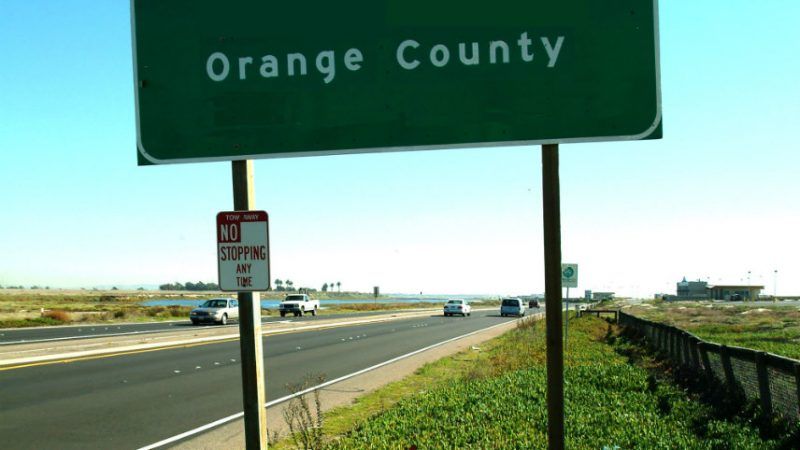Trumpism Hastens Orange County's Shift From Red to Blue
By careening towards populism, the GOP handed over to the Democrats modern, growing, diverse and prosperous suburbs such as Orange County.

During a 2012 magazine interview, actress Michelle Pfeiffer explained that "being from Orange County is in a lot of ways very much like being from the Midwest." She was born in Santa Ana in 1958 and, as strange as her remarks might first seem, she has a point. The attitudes, culture and politics of the place, home to Richard Nixon and birthplace of the Ronald Reagan revolution, did indeed have a Midwestern feel, at least for many years.
So many Midwesterners moved to Orange County that when I got there in 1998, having just arrived from a small city in Ohio, I heard about get-togethers of people from different Midwestern burgs. I couldn't imagine why anyone in a land of palm trees and beaches wanted to even think about, say, Cedar Rapids or Dayton. But I remember instructing my wife, who was petrified of driving in Southern California traffic, to pretend for a while that nothing existed outside of our new hometown of Fullerton. That lovely city feels comfortably Midwestern, although she soon was driving on freeways and exploring everything the county has to offer.
It was obvious even 20 years ago that the nationally known Orange County I had read about was becoming a thing of the past. The politics were changing as the OC moved from being a predominantly white suburban county into a bustling, ethnically diverse urban region with a population larger than 22 states. In 1996, I heard Orange County's controversial Republican congressman "B-1" Bob Dornan give a talk to GOP activists in Des Moines, as he was running for president. That perhaps was the height of OC-style conservative hubris.
Dornan apparently spent too much time in Iowa and not enough in Garden Grove glad-handing voters, as he lost his re-election bid to Loretta Sanchez by 1,000 votes. Sanchez became an Orange County fixture herself. She remained in Congress until she lost the race for U.S. senator to Kamala Harris in 2016, but these days she wouldn't have to claim to be a "blue dog," which is group of Democrats who—unlike those who would do anything the party wanted, even vote for a "yellow dog"—are willing to buck leadership and occasionally side with Republicans. This year, any sort of Democrat would do.
It's clear that the Democrats' modest blue wave turned into a "double overhead" by the time it crashed into OC's beaches. The registrar of voters is still tabulating the final totals, but it's possible none of Orange County's congressional districts will be held by Republicans. Democrats went into the election already controlling three area districts, including the 46th, held by Rep. Lou Correa. It was quite a thing when he ousted a Republican to take a state Assembly seat in 1998, and now he chalked up a congressional re-election with a landslide margin.
Then Democrat Harley Rouda defeated outspoken Trump ally Dana Rohrabacher in the Huntington Beach area's 48th district, which was the heart of OC Republicanism. Darrell Issa's 49th district, which includes parts of San Diego County and southern Orange County, is going for Democrat Mike Levin rather than Republican Diane Harkey. Democrat Katie Porter has pulled ahead of Republican Rep. Mimi Walters in inland South Orange County's 45th district. At this writing, Republican Young Kim is holding a 122-vote lead over Democrat Gil Cisneros in the 39th district centered in Fullerton. Late ballots trend Democratic, however, and there are thousands more to count.
Republicans lost other congressional races outside of the county, were shut out in statewide races and allowed Democrats to grab supermajorities in the Legislature. OC Republicans held their own in state legislative races, but Republican Assemblyman Matt Harper is on the verge of losing his seat. This has sparked a few eulogies. Columnist Gustavo Arellano wrote "an obituary for old Orange County," given that the once rock-ribbed Republican county is now "more purple than Barney the dinosaur."
And former Assembly Republican leader Kristen Olsen, of Modesto, declared the entire California GOP to be dead after Tuesday's drubbing. She blamed the party "partly because it has failed to separate itself from today's toxic, national brand of Republican politics." I largely agree with Olsen's sentiments, although Trump has only hastened trends that have been obvious since before I had moved to the county.
In 2009 after Republicans had run a lousy national election that featured Sarah Palin as the vice presidential nominee, I finally gave up on the GOP and predicted that its move toward populism would cost it elections. Trumpism won in 2016, but in appealing so directly to the concerns of working-class voters in struggling heartland towns, the party handed over to the Democrats modern, growing, diverse and prosperous suburbs such as Orange County. This isn't Ronald Reagan's Midwestern-like OC anymore, which means the GOP has a long road ahead if it hopes to recover from its losses.
This column was first published in the Orange County Register.
Steven Greenhut is Western region director for the R Street Institute. He was a Register editorial writer from 1998-2009. Write to him at sgreenhut@rstreet.org.


Show Comments (105)